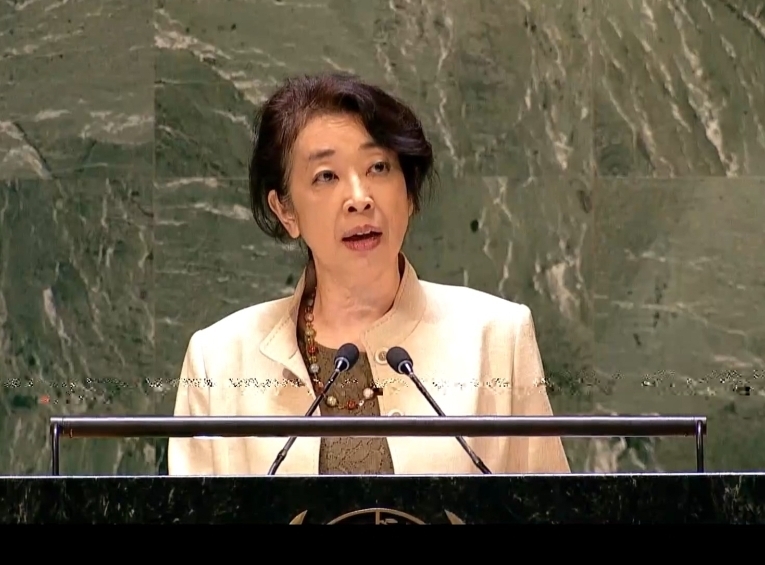Statement by H.E. Ambassador SHINO Mitsuko, Deputy Permanent Representative of Japan to the United Nations, at the United Nations General Assembly Plenary Meeting Agenda item 121 on “The United Nations Global Counter-Terrorism Strategy: Report of the Secretary-General (A/77/266) - Debate on the item”
2023/6/23

(As delivered)
Mr. President,
Let me start by expressing my gratitude to you for convening today’s plenary meeting on the Eighth Global Counter-Terrorism Strategy (GCTS) Review. We would also like to extend our sincere appreciation to Ambassador Robert Keith Rae and Ambassador Tarek Ladeb for their strong leadership as well as the Permanent Missions of Canada and Tunisia for their dedication throughout the process that led to the adoption by consensus of the resolution on the GCTS review.
My delegation has been constructively engaged in the whole negotiation process. We note that there have been different views expressed during the negotiation and not all of them were reflected in the adopted resolution.
Still, we welcome the adoption of this 8th review of the GCTS by consensus, because we believe the spirit of consensus of this resolution enables us to express our united will and commitment on global counter-terrorism efforts.
Japan welcomes the inclusion of language on Security Council resolution 2664, which was adopted in December last year. We emphasize that this is a landmark resolution at the nexus between humanitarian activities and Security Council sanction measures. We also reiterate that the Security Council’s sanctions are an important tool under the Charter of the United Nations in the maintenance and restoration of international peace and security.
Japan also welcomes the language on ensuring appropriate follow-up efforts on the Kyoto Declaration towards the Fifteenth UN Congress on Crime Prevention and Criminal Justice in 2026. This is critical to ensure that we, the UN Member States, continuously update our policies in light of evolving global challenges in the realm of crime prevention and counter-terrorism.
We reiterate the importance of human rights, gender, and upholding the rule of law. They constitute Pillar IV of the Strategy and are integral to its effective and comprehensive implementation. In this context, we look forward to further discussing how we can improve transparency and effectiveness regarding United Nations entities’ integration of the cross-cutting elements of the Strategy.
We would like to commend the co-facilitators for their inclusive approach throughout this negotiation process. Opportunities to listen to civil society voices including women-led organizations allowed us to consider a variety of perspectives, which we believe were crucial when discussing the review of the Strategy.
Finally, we would like to reiterate that addressing root causes such as poverty and inequality is indispensable in the fight against terrorism. Japan believes this requires a human security approach to protect and empower people through a cross-cutting, holistic, and coordinated handling of all challenges, thus leaving no one behind. We look forward to future discussions to this end.
Thank you.
Let me start by expressing my gratitude to you for convening today’s plenary meeting on the Eighth Global Counter-Terrorism Strategy (GCTS) Review. We would also like to extend our sincere appreciation to Ambassador Robert Keith Rae and Ambassador Tarek Ladeb for their strong leadership as well as the Permanent Missions of Canada and Tunisia for their dedication throughout the process that led to the adoption by consensus of the resolution on the GCTS review.
My delegation has been constructively engaged in the whole negotiation process. We note that there have been different views expressed during the negotiation and not all of them were reflected in the adopted resolution.
Still, we welcome the adoption of this 8th review of the GCTS by consensus, because we believe the spirit of consensus of this resolution enables us to express our united will and commitment on global counter-terrorism efforts.
Japan welcomes the inclusion of language on Security Council resolution 2664, which was adopted in December last year. We emphasize that this is a landmark resolution at the nexus between humanitarian activities and Security Council sanction measures. We also reiterate that the Security Council’s sanctions are an important tool under the Charter of the United Nations in the maintenance and restoration of international peace and security.
Japan also welcomes the language on ensuring appropriate follow-up efforts on the Kyoto Declaration towards the Fifteenth UN Congress on Crime Prevention and Criminal Justice in 2026. This is critical to ensure that we, the UN Member States, continuously update our policies in light of evolving global challenges in the realm of crime prevention and counter-terrorism.
We reiterate the importance of human rights, gender, and upholding the rule of law. They constitute Pillar IV of the Strategy and are integral to its effective and comprehensive implementation. In this context, we look forward to further discussing how we can improve transparency and effectiveness regarding United Nations entities’ integration of the cross-cutting elements of the Strategy.
We would like to commend the co-facilitators for their inclusive approach throughout this negotiation process. Opportunities to listen to civil society voices including women-led organizations allowed us to consider a variety of perspectives, which we believe were crucial when discussing the review of the Strategy.
Finally, we would like to reiterate that addressing root causes such as poverty and inequality is indispensable in the fight against terrorism. Japan believes this requires a human security approach to protect and empower people through a cross-cutting, holistic, and coordinated handling of all challenges, thus leaving no one behind. We look forward to future discussions to this end.
Thank you.
